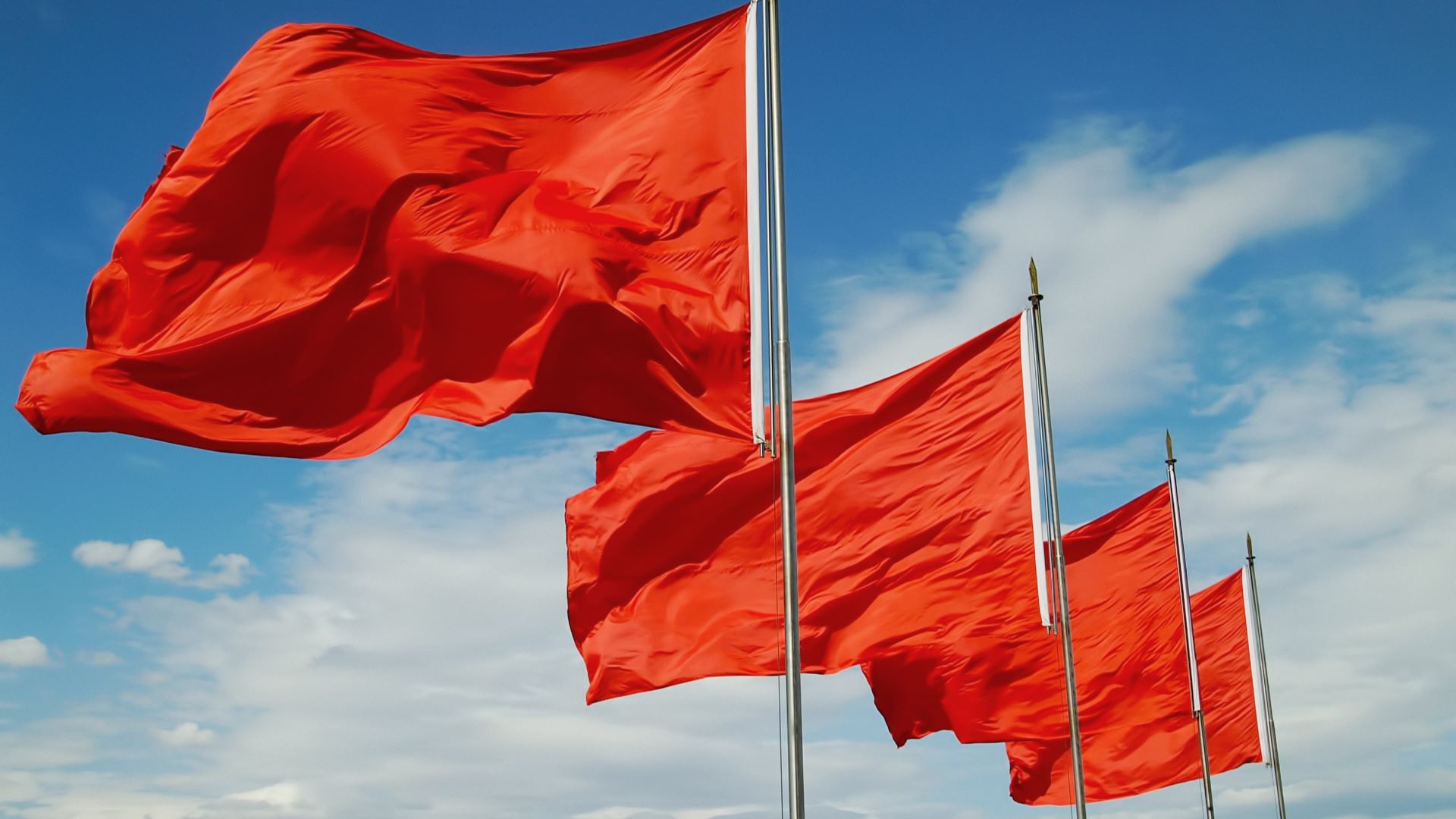The top 5 VPN red flags to avoid
Don't get stuck with a dodgy VPN by avoiding these 5 things

Sign up for breaking news, reviews, opinion, top tech deals, and more.
You are now subscribed
Your newsletter sign-up was successful
Virtual private networks, or VPNs, are great tools that keep you and your data safe online by encrypting your connection. This is especially useful if you're using public Wi-Fi, as it means all connection requests and network traffic is routed through your VPNs encrypted servers, meaning you are effectively hidden from all others connected to the network. By being hidden, you keep yourself safe from anyone trying to access your data via public Wi-Fi.
Not only can VPNs keep you protected online, but they can also help you get around content blocks and even geo-restrictions, meaning you can watch content from all across the globe from the comfort of your home.
As VPNs are such a handy piece of kit, it's understandable why you'd be in the market for one. But, as with all products, there are some VPNs out there that just aren't up to scratch. This article will give you a handy guide of what to look out for and avoid when you're looking for the best VPN.
1. It logs, sells and/or tracks your data
The whole point of a VPN is that your browsing is kept anonymous and your data protected, so if a VPN tracks, logs or sells your data, it is completely worthless as a VPN.
Unfortunately, despite this being a particularly important hurdle for VPN providers to get over, some still fail to do this, with research finding that 70% of VPN providers violate GDPR provisions through their use of web tracking and cookies.
If you want to avoid your data being sold, it's a good idea to go for a paid-for VPN over a free VPN. Free services have to make money in some way, and unfortunately for some, this is through selling your browsing data or even your personal information from your account profile to third parties. Since a VPN is there to keep you anonymous online, it goes without saying that any VPN provider that does this should definitely be avoided.
When looking to get a VPN, it's important to check that your chosen provider has an audited, proven no-logs policy—like NordVPN, Mullvad or Surfshark.
2. It throttles your connection
No matter what your VPN is going to be used for, it needs to have good connection and download speeds. That's why it's important to make sure that your VPN doesn't throttle your connection, causing slow loading, buffering content and drawn-out downloads.
Luckily, you can avoid these super-slow providers by checking out independent speed checking tests. Here at TechRadar, when we put the fastest VPNs to the test, we use two different speed measuring tools—WireGuard or proprietary and OpenVPN—giving us an idea of the speeds the VPNs are really capable of.
While this speed testing may only give us an in-the-moment reading of the VPN's speed rather than a live representation, it's still a good measure of what these VPNs can do.
3. It isn't certified
If you're looking for a mobile VPN specifically, this section is especially important. Before downloading a VPN, it's important to check its reviews and its certifications to double check that everything really is as it seems.
If you're an Android VPN user, the Google Play store has introduced a handy tool to prevent you from downloading malware masquerading as a VPN. The "independent security review" button means that a VPN provider has agreed to be audited in accordance with the Mobile App Security Assessment (MASA) guidelines created by the App Defence Alliance (ADA).
During the audit, the apps must pass certain requirements in areas including permissions, data storage and privacy, coding, networking, authentication, and cryptography. iPhone VPNs are typically less likely to be malicious, but with Apple now allowing third-party stores to be installed, there's still a risk and you should stay vigilant.
There's also the VPN trust seal accreditation program, an initiative launched by the Internet Infrastructure Coalition (i2Coalition) which helps customers see which VPNs meet five key criteria. This includes: using appropriate security measures; not over-promising to consumers; collecting as little customer information as possible; informing both their customers and the wider public of their actions and procedures; and supporting freedom of expression and access to the global internet through their technology. Those that have earned the seal include top VPN providers like NordVPN, ExpressVPN, and Surfshark.
By making sure that your VPN app has been independently verified and audited, you stop yourself from downloading one that at best doesn't work and at work is trying to steal your data.
4. It doesn't unblock content
Aside from masking your IP and browsing data, another great thing about VPNs is that they can allow you to unblock geo-blocked content, access streaming libraries from across the world and even get around content blocks put in place by your school, organization or even government.
With this in mind, it's important to go for a VPN that actually can unblock the content you want—or need—it to. If you're after a VPN to unblock content in a specific region, whether that's your own or not, you need to make sure that it has a server in that region.
If you want to use a VPN to get your hands on content libraries from across the world, you similarly need to make sure your chosen VPN has servers in those countries. Additionally, you need to make sure it's actually capable of unblocking your chosen streaming service(s). Check out our list of the best streaming VPNs for our top VPNs that are guaranteed to do this.
5. It doesn’t use post-quantum encryption
While post-quantum encryption sounds like something someone on the Starship Enterprise would know a lot about, it does actually have real-world impacts.
Essentially, as quantum computers get more powerful, scientists believe that one day they will be able to crack the algorithms we currently use to encrypt our connections. This day, also known as Q-Day, is the day when everyone's data is no longer safe. Since VPNs work by encrypting your connection, this area of study is integral to their continued existence—which is why VPN providers like ExpressVPN have started to offer post-quantum protection.
Post-quantum algorithms make the things they're encrypting secure against attacks from both quantum and classical computers, giving them an extra layer of security. So, by using post-quantum encryption, VPN providers make sure that they are protected against quantum computing attacks and can encrypt users’ traffic no matter what.
While quantum computers are still being primarily used for research, the threat of Q-day looms near. So, while it may not be here yet, consider plumping for a VPN that does offer post-quantum protection, so you can be safe in the knowledge that your data will stay safe. No matter what.
VPN FAQs
Are VPNs safe?
While some VPNs have security issues like the ones we've covered in this article, the vast majority of VPNs are safe. If you're concerned about which ones are and aren't, it's a good idea to read independent reviews, like the ones here on TechRadar. We even have a list of the most secure VPNs if you're looking for VPNs that are extra safe.
Is using a VPN legal?
It depends on where you are. It's still a crime if it's illegal in your country, regardless of whether you're using a VPN
The answer to this question depends on where in the world you are. For the majority of countries, using a VPN is perfectly legal. For some countries, however, the use of VPNs is heavily restricted or even outright banned. Using a VPN in these countries is illegal.
It's also important to note that if you're using a VPN to access restricted content (e.g. content that is not licensed in your country, or to get around content blocks put in place by your company or school), this may not be illegal but it may still land you in hot water. You could get banned from the streaming service you're using or get in trouble with your organization/school.
Finally, if you're using a VPN to do something illegal, then it's still illegal.
Are VPNs easy to use?
While there may be some VPNs that are geared towards experts rather than novices, all our VPN recommendations go through rigorous testing to make sure they can be used by newbies and veterans alike. Many of the best VPNs also come with money-back guarantees or free trials, so you can get a feel for what they're like, risk-free.
Sign up to the TechRadar Pro newsletter to get all the top news, opinion, features and guidance your business needs to succeed!

Olivia joined Tom's Guide in October 2023 as part of the core Future Tech Software team, and is the Commissioning Editor at Tom's Guide. With a background in cybersecurity, Olivia is interested in how VPNs protect users' privacy, and how they improve online safety. She also regularly uses VPNs to make sure they deliver what they promise, and specializes in testing VPNs with streaming sites.